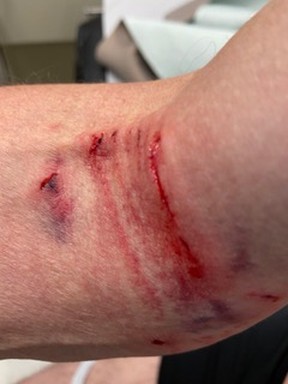Ottawa bylaw issues more than $1,000 in fines after dog attack in Vanier

Article content
City officials have issued more than $1,000 in fines to the owner of the dog that bit two men in Vanier on Saturday.
Advertisement 2
Article content
Tania McCumber, the acting director of bylaw and regulatory services, told this newspaper on Monday that bylaw officers met with the two victims and “in the interest of public safety immediately issued a muzzle order for the animal.”
The officers also issued five charges under the animal care and control bylaw, including two counts, each carrying a $615 fine, of failing to ensure a dog does not bite or attack a person without provocation. The owner was also charged with two counts of failing to keep a dog on a leash, a $125 fine per offence, and failing to register a dog in the city of Ottawa, which is another $125 fine.
The attack occurred as a Saturday night dance party for seniors was wrapping up at the Centre Pauline-Charron, a francophone community centre in Vanier. Bruce McConville, one of the two men who suffered bite wounds, told this newspaper that the dog, which lives in a home on Cyr avenue, attacked the men outside the community centre and thwarted attempts by police to subdue it.
Advertisement 3
Article content

McCumber said that in Ottawa, the animal care and control bylaw is the primary tool city officials use to govern dogs of all breeds. Under that bylaw, if city officials find that a dog is “vicious,” it must be muzzled when not inside the owner’s home, securely leashed and surrounded by a high fence when outside. It must also be muzzled and leashed when walked.
Officials do, however, have the power to bring charges against the owner of the dog. Under provincial legislation called the Dog Owners’ Liability Act (DOLA), owners whose dogs have bitten or attacked, or are deemed to pose a menace to public safety can face a $10,000 fine, six months imprisonment and may have to pay restitution to victims. This can also lead to a court ordering that the dog be muzzled, leashed or even that it be destroyed.
Advertisement 4
Article content
In the case of a pit bull being involved in a bite or attack incident, as witnesses allege happened on Saturday, DOLA is even more severe: a destruction order must be issued. Pit bulls have been banned in Ontario since 2005, although there are exemptions in the law for pit bulls that participate in “fly ball” tournaments and dog shows.
It was unclear on Monday if the owner of the dog involved in the Vanier attack would face charges under DOLA. An investigation into the incident was ongoing, McCumber said.
Jennifer Friedman, a Toronto-based lawyer devoted exclusively to animal law, said incidents of this kind are all-too-common, and consequences to the dog and their owner can vary depending on the city bylaws in play.
Advertisement 5
Article content
As for the breed-specific legislation in Ontario, Friedman said she believed the pit bull ban was overly broad and used catch-all language which allows any dog that appears to have the traits of a pit bull to be included in the ban.
“My perspective is the pit bull ban is really ineffective,” said Friedman, “and it’s a poor provision in the statute because animal bites have actually been on the rise since the pit bull ban was instituted.”
Friedman, who owns two dogs herself, said preventing these types of incidents largely rests on the shoulders of dog owners. It is the responsibility of members of the public, she said, to ensure that dogs are properly trained and socialized.
“I think it’s incumbent on all dog owners to properly train companion animals and to ensure that if they are taking them outside that they’re using a leash and being responsible,” she said.
Advertisement 6
Article content
“I think the best approach moving forward to avoid these sorts of situations is appropriate training, not putting your dog in situations that could create an altercation and most importantly to be responsible with them. In a situation like this — again, I don’t know all the specific details, but it certainly sounds to me like the owners were not being responsible in how they were overseeing their dog.”
An Ottawa Public Health spokesperson said that, in general, animal bite attacks prompt concerns over rabies, a virus which is spread by bites that break the skin. Public health inspectors conduct investigations after bite attacks to ensure rabies is not being spread.
Attempts to reach the owner of the dog involved in the Vanier attack were unsuccessful on Monday.






